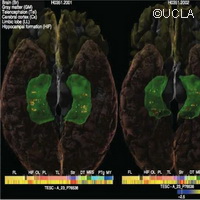Connection found between genes and brain size, intelligence
An international team of scientists has successfully mapped the human genes that either increase or disrupt the brain's resistance to various neurological and mental illnesses. This study, presented in the journal Nature Genetics, has identified novel genes that could provide insight into the differences that exist in brain size and intelligence. The results could also lead to the development of new drug treatments. More than 200 scientists from 100 institutions had 2 objectives. 'We hunted for genes that increase your risk for a single disease that your children can inherit,' explains the senior author of the study, Professor Paul Thompson of the David Geffen School of Medicine at University of California, Los Angeles (UCLA) and a member of the UCLA Laboratory of Neuro Imaging in the United States. 'We hunted for factors that cause tissue atrophy and reduce brain size, which is a biological marker for hereditary disorders like schizophrenia, bipolar disorder, depression, Alzheimer's disease and dementia.' Professor Thompson and colleagues from Australia and the Netherlands launched the ENIGMA ('Enhancing neuro imaging genetics through meta-analysis') project three years ago, where the researchers pooled their brain scans and genomic data. 'Our individual centres couldn't review enough brain scans to obtain definitive results,' says Professor Thompson. 'By sharing our data with project ENIGMA, we created a sample large enough to reveal clear patterns in genetic variation and show how these changes physically alter the brain.' What set this work apart from past research studies was that researchers measured the brain's size and memory centres in many magnetic resonance imaging (MRI) images from more than 21 100 healthy subjects, while screening their deoxyribonucleic acid (DNA) as well. 'Earlier studies have uncovered risk genes for common diseases, yet it's not always understood how these genes affect the brain,' says Professor Thompson. 'This led our team to screen brain scans worldwide for genes that directly harm or protect the brain.' The researchers observed subtle shifts in the genetic code of subjects whose images showed smaller brains. The memory centres were also smaller, according to the team. It should be noted that no matter where the subjects hailed from, the same genes affected the brain in similar ways. 'Millions of people carry variations in their DNA that help boost or lower their brains' susceptibility to a vast range of diseases,' the UCLA researcher says. 'Once we identify the gene, we can target it with a drug to reduce the risk of disease. People also can take preventive steps through exercise, diet and mental stimulation to erase the effects of a bad gene.' The team also found genes that explain individual differences in intelligence, uncovering a variant in a gene called HMGA2 that affected both brain size and intelligence. DNA has four bases: A, C, T and G; subjects whose HMGA2 gene had C instead of T had larger brains and recorded higher results on standardised intelligence quotient (IQ) tests. For more information, please visit: Nature Genetics:http://www.nature.com/ng/index.htmlDavid Geffen School of Medicine at UCLA:http://dgsom.healthsciences.ucla.edu/dgsom/
Countries
Australia, Netherlands, United States



